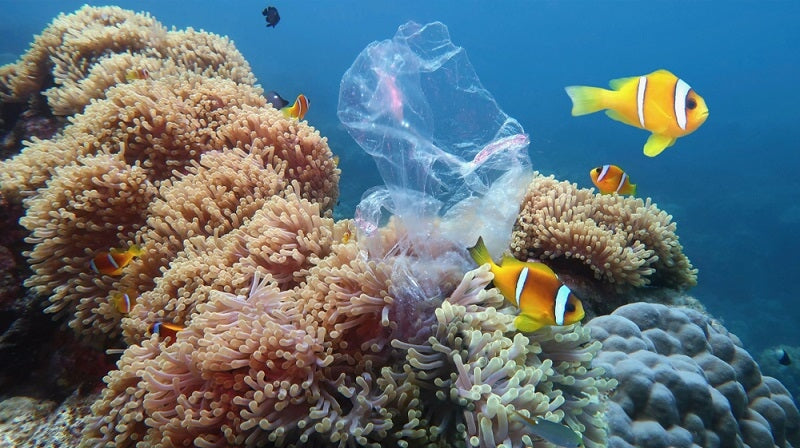
TLDR
For many of us, recycling is second nature, as automatic as switching the lights off when we leave home or turning off the faucet once we’ve finished washing our hands. Our collective efforts pay off, too: Recycling plastic and other recyclable materials boosts the health of our environment, helps shield the world for future generations, and bolsters the economy.1
Most of us realize this—and it fuels our decision to separate our waste and keep an eye out for recycling bins when we’re out in public. What’s less obvious is what would happen to our planet if recycling came to a skidding stop
Read on as we peel back the layers on the effects it would have.
7 Major Impacts of Stopping Recycling
Recycling—sans the bright blue receptacles we’ve grown accustomed to—got its start in the 1800s, with the first recycling programs introduced in the 1960s. This was when environmental concerns began to surface more vividly, thanks in part to environmental legislation created by Lyndon B. Johnson and Rachel Carson’s seminal book, Silent Spring.2 It’s only been in the last 40 or so years that recycling has gone from a necessity to a deeply-entrenched habit.
Why do people not recycle? There are several reasons why people may choose not to recycle but what are the effects of stopping this practice? Here are some of the potential effects:
- Overtaxed Landfills
- Increased Pollution and Climate Change
- Human Health Risks
- Destruction of Natural Habitats
- Damage to Wildlife
- Increased Plastic Pollution in the Ocean
- Deforestation
Let’s take a closer look at each one of these effects and how they would create a cascade of damage—both in the U.S. and across the planet.
#1 Overtaxed Landfills
Even the most conscientious among us generate solid waste. The year 2018 saw a staggering 292.4 million tons of waste. To put this into perspective, that’s the equivalent of nearly 1.5 million blue whales—the largest mammal on Earth.3 This comes down to roughly 4.9 pounds of waste per individual per day (who knew those apple cores, cracker boxes, and Spindrifts could add up so quickly?).
All of this waste must go somewhere. Here’s how it’s distributed:
Initially, this may not seem all that awful. And yet, landfills across the U.S. are already nearing capacity, with some estimates suggesting we have 16 years of space left.5 If recycling plastic ceased, that percentage of materials—32%—would accelerate this, ultimately leading to overflow or the creation of new landfills.
All of this is compounded by the fact that China has imposed stricter regulations on foreign waste, which, for residents of the United States, means a higher amount of plastic trash to deal with. Overall, this would create a host of the problems listed below.

#2 Increased Pollution and Climate Change
Landfills may be out of sight and out of mind for many of us, but we feel their effects.
The EPA reports that landfills are the third biggest source of methane pollution.6 As a potent greenhouse gas, methane is 80% more aggressive than carbon dioxide when it comes to turning up the temperature of the Earth.7
We’ve already begun to witness the effects of global warming, from extreme, devastating weather to melting Arctic ice caps.8
Methane isn’t the only gas that’s emitted from landfills either. They also release:
- Carbon dioxide
- Hydrogen
- Nitrogen
- Non-methane organic compounds
These gasses contribute to climate change as well while also increasing smog.9
So, what happens if we don’t recycle? Climate change and plastic pollution will rise—and with it, continual damage to the planet and its inhabitants.
#3 Human Health Risks
An increase in the number of landfills, as well as landfill spillage, may pose a number of threats to human health. Research demonstrates that pollutants caused by landfills have led to respiratory problems in people who live near them, as well as issues caused by groundwater pollution. These pollutants have been linked to conditions like:10
- Lung infections
- Cancer
- Respiratory allergies
- Low birth rates
- Asthma attacks
- Congenital defects9
Landfills are typically installed near low-income residential areas and disproportionately affect people of color.11 This may become amplified if we cease recycling altogether and add more waste to landfills that are already bursting at the seams.
#4 Destruction of Natural Habitats
More than 1,800,000 acres of land across the United States have been repurposed into landfills,11 killing off plants that could counter global warming.12
Indeed, 600 acres of land are needed to construct a landfill. If recycling fills what precious space we have left in the country’s landfills and more are built, it will result in the destruction of more land.
To add insult to injury, landfills decrease property values for people who live near them. If we're forced to construct more to accommodate the solid waste that could easily be recycled, then this trend will only continue.
#5 Damage to Wildlife
A world in which curbside recycling doesn’t exist calls to mind the comic dystopia and the mounds of garbage that humans had to contend with in Mike Judge’s Idiocracy. It’s an alarming image and even more disturbing once we consider how a surplus of garbage would and does affect our wildlife. Here are just a few of the effects:13
- Marine animals often mistake rubbish for food waste. Eating items like an empty Dasani water bottle can cause bowel perforations, choking, and death.
- Aluminum cans that escape into the environment can cut animals–or cause them to get trapped inside of one.
- Plastic soda rings can get wrapped around an animal’s head and potentially be deadly.
Here’s the thing: Most of these items can be recycled and prevent these events from occurring.
#6 Increased Plastic Pollution in the Ocean
What would happen if we didn’t recycle our plastic bottles, bags, and containers?
Alas, it’s already happening: Data shows that roughly 79% of plastics are disposed of in landfills and discarded in the environment.14 Experts predict that if the failure to recycle plastics continues, they’ll end up in the ocean—putting the health of our waters at increased risk and potentially rendering our oceans unswimmable.

#7 Deforestation
The EPA reports that 67.4 million tons of paper were recycled in 2018 alone. If we didn’t recycle, deforestation would skyrocket to compensate for this, compounding the complications listed above and others, such as:
- Climate change
- Worse air quality
- Increased food insecurity
- The displacement of indigenous and rural communities
- Reduced biodiversity
A planet overflowing with garbage with fewer trees and increased smog—all possibilities if we kicked our recycling habits to the curb. Restoring the planet and investing in natural solutions—that’s a legacy we can all stand behind.
Recycling Tips for a Better World
We can dodge a world as grim as the one described above by prioritizing recycling and other green solutions by participating in events like National Recycling Day. Indeed, recycling has a bevy of benefits. Here are just a few of them:15
- Curbs landfill waste
- Creates jobs and helps boost our economy
- Reduces pollution
- Preserves our timber
- Conserves resources
With a touch of mindfulness, plastic recycling can easily become a way of life:

Get Real About Our Future with Reel Paper
We can dodge the whole question of what will happen if we don’t recycle and the widespread damage by making a commitment to recycling what we can—and using recycled material goods as much as possible.
Reel Paper makes this endeavor simple and satisfying. We know that single-use paper products are part of leading a clean, healthy lifestyle. But we also know the toll they can take on our planet. Start building a healthier, more vibrant tomorrow by making the conscious effort to recycle today!
Sources:
- National Institutes of Health. Benefits of recycling. https://nems.nih.gov/environmental-programs/pages/benefits-of-recycling.aspx
- History. When did Americans start recycling https://www.history.com/news/recycling-history-america
- US EPA. National over: facts and figures on materials, wastes and recycling. National Overview: Facts and Figures on Materials, Wastes and Recycling | US EPA
- USA Facts. How much trash do Americans recycle? https://usafacts.org/articles/how-much-trash-do-americans-recycle/
- Waste Dive. Disposal capacity crunch paves way for more industry consolidation and price increases, per report. https://www.wastedive.com/news/report-us-landfill-disposal-capacity-decline-consolidation/569953/
- Environmental Defense Fund. EPA unveils plan to reduce dangerous pollution from landfills. https://www.edf.org/media/epa-unveils-plan-reduce-dangerous-pollution-landfills
- Stanford University. Methane and climate change. https://earth.stanford.edu/news/methane-and-climate-change
- Live Science. What are the effects of global warming? https://www.livescience.com/37057-global-warming-effects.html
- University of Colorado Boulder Environmental Center. The hidden damage of landfills. https://www.colorado.edu/ecenter/2021/04/15/hidden-damage-landfills
- International Journal of Environmental Research and Public Health. Health and environmental risks of residents living close to a landfill: a case study of Thohoyandou Landfill, Lampopo Province, South Africa. https://www.ncbi.nlm.nih.gov/pmc/articles/PMC6617357/
- National Geographic. Landfills. https://education.nationalgeographic.org/resource/landfills
- Live Science. How plants may help offset global warming. https://www.livescience.com/29180-plants-offset-global-warming-climate-change.html
- PETA. How littering kills animals. https://www.peta.org/features/litter-kills-animals/
- National Geographic. A whopping 91 percent of plastic isn’t recycled. https://education.nationalgeographic.org/resource/whopping-91-percent-plastic-isnt-recycled
- US EPA. Recycling basics. https://www.epa.gov/recycle/recycling-basics
- US EPA. Frequently asked questions about plastic recycling and composting. https://www.epa.gov/trash-free-waters/frequently-asked-questions-about-plastic-recycling-and-composting




0 comments